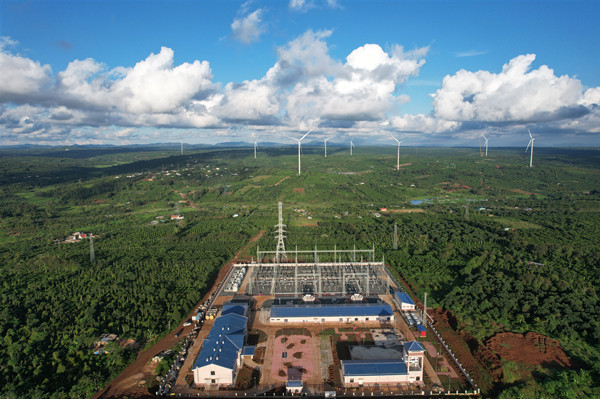Villagers at the County of Krongbuk, Dak Lak Province of Vietnam mainly make a living by growing agricultural products like coffee and pepper and some fruits like durian.
"There used to be many deep grooves on the road which were like 'bomb-craters'. Whenever it rained, it was hard to get out and children could not go to school either," Mr. Thanh said. Durian is the only source of income for Mr. Thanh's family but because of the frequent rain and the poor road condition, lots of durians were not able to be transported and rotted in the field. Mr. Thanh was once trapped in a groove when he drove a tractor loaded with durians on a rainy day. Luckily, he met staff members from China Huadian Corporation Ltd. at the CHEC Dak Lak 4x50MW Wind Farm project who were passing by. With their help, Mr. Thanh and his tractor were freed from the groove. The project members also gave Mr. Thanh a hand, sending his durians to the collection spot. That was when Mr. Thanh and the project's staff members became tight friends. Although speaking different languages, Mr. Thanh and the project's staff members share the same promising land and communicate with each other in a way all of them can understand. Mr. Thanh taught the project's staff members how to differentiate between durian types and the staff members at the project offered their suggestion on fruit growth and helped repair the village road. Meanwhile, they also helped villagers find suitable agricultural product buyers.

A panoramic view of the CHEC Dak Lak 4x50MW Wind Farm project in Vietnam [Photo provided to sasac.gov.cn]
Though faced with mountains and rivers in a foreign land, love never dies. The previous "bomb-craters" are now turned into a flat gravel road and a brand-new friendship bridge built by the project's staff members has also been put into operation. The road is repaired, and the bridge is in service. Now, villagers no longer worry about transporting the agricultural products, nor schooling absences because of the heavy rain. What's more, they have seen dramatic improvement in their income.
(Executive editor: Li Zhiyong)